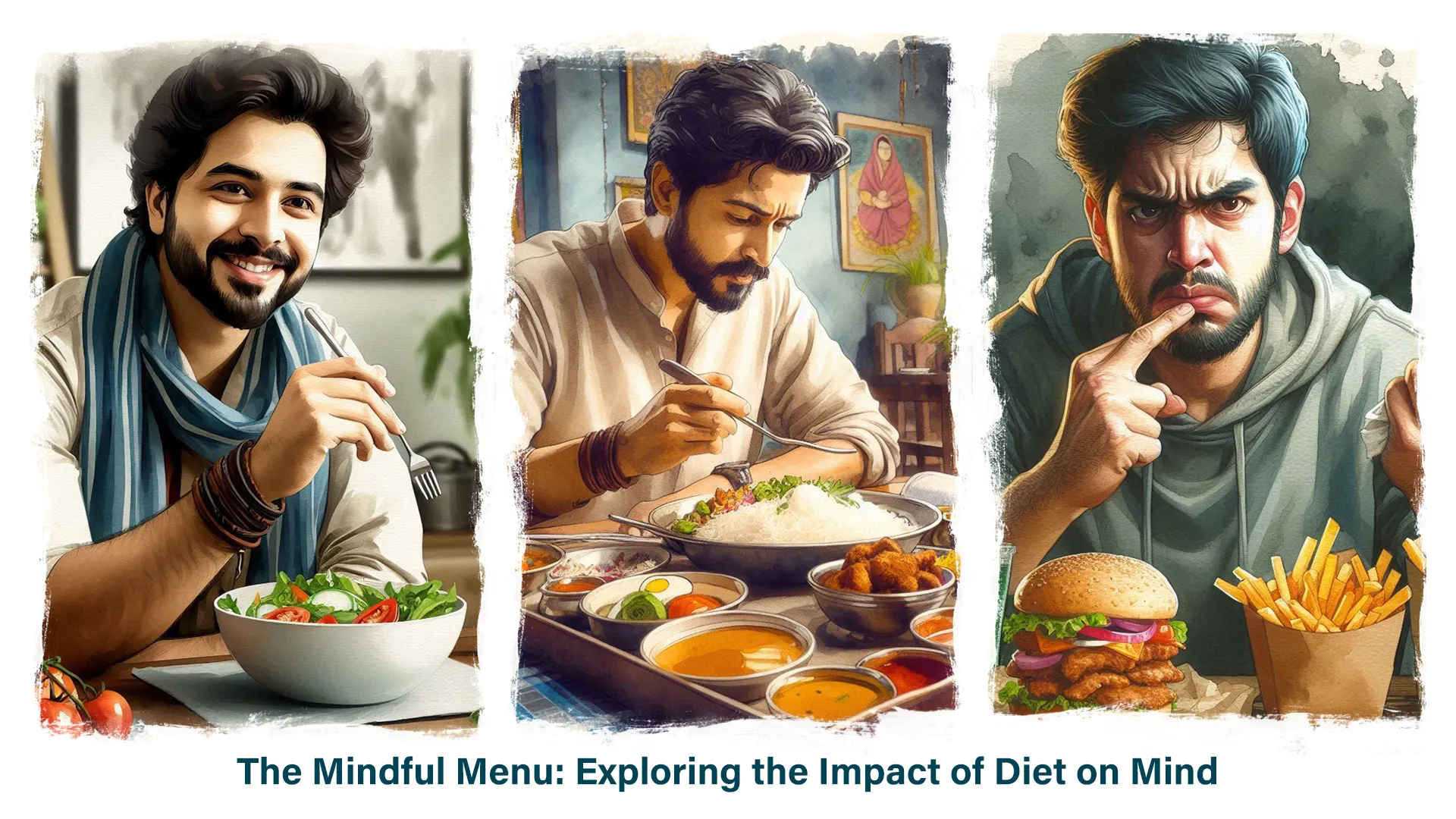Have you ever wondered how the food you choose affects your mind and body? Ayurveda, an ancient Indian system of medicine, offers a unique perspective on food categorisation. It classifies foods based on their influence on our inner state, dividing them into three categories: Sattvic, Rajasic, and Tamasic.
Sattvic Foods: Nourishing for Body and Mind
Imagine a diet rich in fresh, wholesome ingredients. Sattvic foods fall into this category. Think juicy fruits, colourful vegetables, healthy grains, nuts, seeds, and dairy products. These foods are considered to promote clarity, peace, and well-being. They provide essential nutrients and support a balanced mind and body.
Rajasic Foods: The Allure of Taste
While not inherently bad, Rajasic foods can become imbalanced. These are foods with intense flavours – spicy, salty, or sugary. While they may be tempting for their taste, overindulging can lead to restlessness, hyperactivity, and even aggression.
Tamasic Foods: To Be Avoided
Tamasic foods are generally considered to impact health and well-being negatively. This category includes stale, processed foods, meat, fish, and eggs. Ayurveda suggests these foods can increase lethargy, negativity, and even cloud judgment.
Nourishing Your Vegetarian Body
Ayurveda emphasises a plant-based diet. Legumes, lentils, pulses, and dairy products are all excellent protein sources. They provide the building blocks your body needs without the potential drawbacks associated with meat.
Fats: Essential But Balanced
Healthy fats are crucial for our well-being, despite some misconceptions. They play a vital role in brain function and hormone production. Aim for a balanced approach, including unsaturated fats from nuts, seeds, and avocados. Limit saturated fats in red meat and dairy products to avoid cholesterol buildup.
Micronutrients: The Power of Vitamins and Minerals
Fresh fruits and vegetables are powerhouses of vitamins and minerals, essential micronutrients for optimal health. To retain their full benefits, cook them wisely. Steaming or lightly sautéing helps preserve valuable vitamins that might be lost with excessive heat or overcooking.
Fruits: Nature's Cleansers and Antioxidants
Fruits play a vital role in a healthy diet. They cleanse the digestive system and maintain an alkaline bodily environment. Additionally, fruits are rich in antioxidants, which help combat free radicals and prevent chronic diseases. Opt for various fruits, focusing on darker varieties particularly rich in antioxidants.
Ayurveda and Naturopathy offer a holistic approach to diet that goes beyond just counting calories.
Ahara Vidhi: More Than Just What You Eat
This philosophy focuses on the entire food process, including quality, quantity, and how you eat it – all based on your individual digestive capacity.
Understanding Food: Taste, Energy, and Digestion
Ayurveda believes each food has a unique taste, energy, and impact on digestion. Your digestive fire (jaṭharāgni) plays a key role – if overloaded by incompatible combinations, it can lead to indigestion and even disease.
Food Classification: Light vs. Heavy
Ayurvedic food classification considers digestibility. Light foods like mung daal and Basmati rice stimulate digestion and are less harmful, even in excess. Heavy foods like black gram and raw vegetables require a more robust digestive fire and should be enjoyed in moderation.
Categorising Food for Better Digestion
Charak Samhita, a foundational Ayurvedic text, categorises food in various ways:
- Source: Grains, pulses, vegetables, fruits, etc.
- Form: Eatable, drinkable, lickable, and masticable
- Effect: Wholesome or unwholesome
Wholesome vs. Unwholesome Foods
The key to a healthy diet is consuming foods that maintain balance in your body and eliminate imbalances. Wholesome foods include red rice, green gram, and cow's milk, while unwholesome options like wild barley and sheep's milk should be avoided.
Embrace Ayurveda and Naturopathy for a Balanced Approach to Eating
By understanding these principles, we can move beyond the confusion and make informed dietary choices that nourish our bodies and promote overall well-being.
Click for details on the Classification of Food in Ayurveda
Click for details on the Classification of Food in Ayurveda









What our Participants say